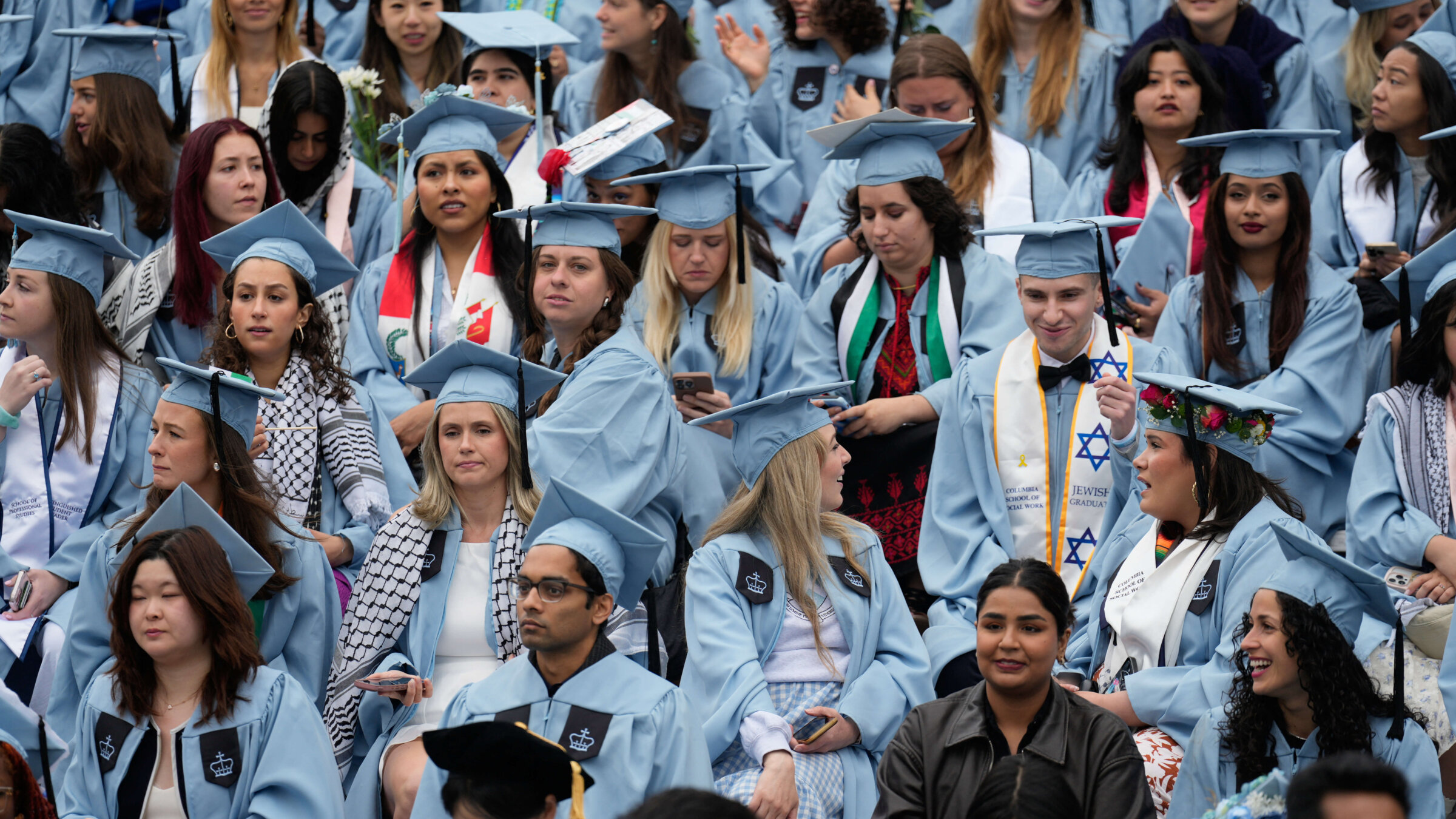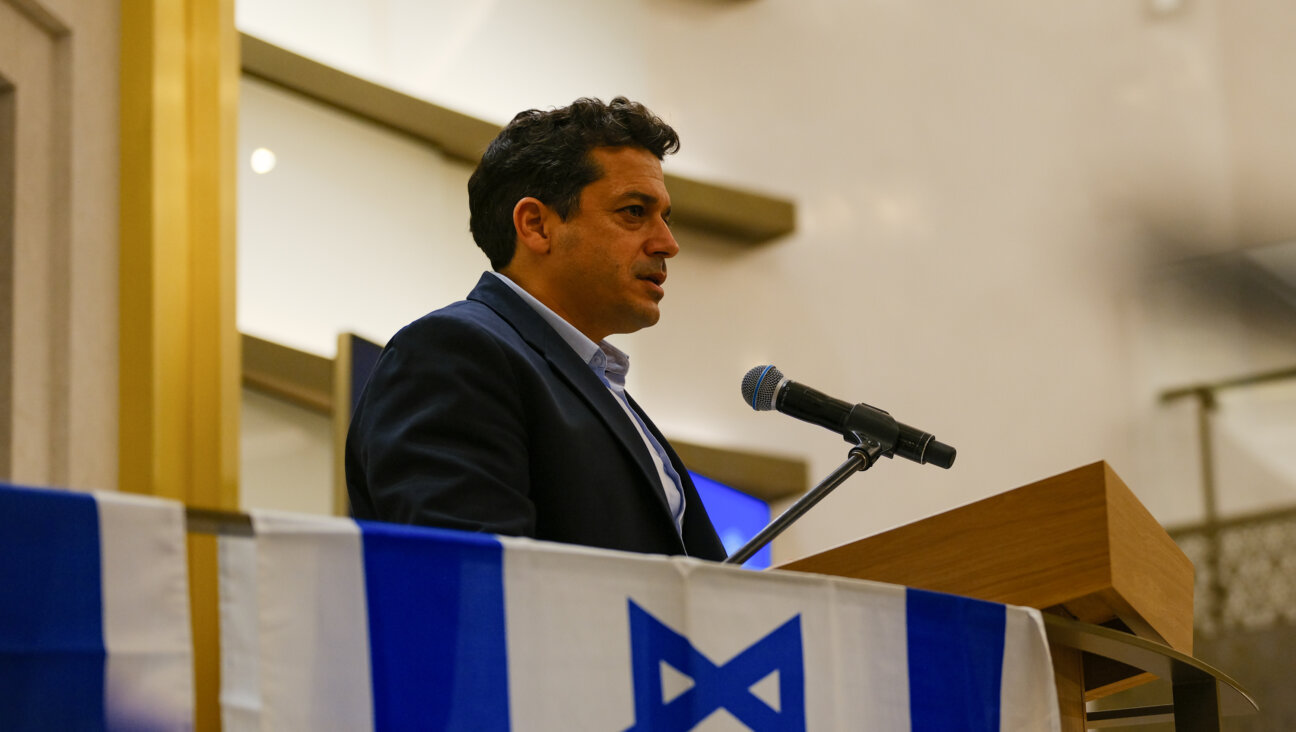Columbia’s settlement won’t solve its campus crisis. Here’s what could.
Many of the negative experiences that Jewish students are having fall outside the bounds of lawsuits or legal settlements

Students look on during the Commencement Ceremony at Columbia University in New York on May 21, 2025. Photo by Seth Wenig/Pool/AFP via Getty Images
Antisemitism Decoded is the Forward’s biweekly newsletter that helps you separate the signal from the noise and understand current debates over Jewish safety. Sign-up here.
Columbia’s settlement with the Trump administration treats the discomfort that many Jewish students felt over the past two years as largely a legal problem: Their unhappiness was a result of antisemitic discrimination, which the university has an obligation to prohibit.
That is a common way of understanding what is often called the antisemitism crisis on college campuses. But as I’ve detailed before, many of the negative experiences that Jewish students are having fall outside the bounds of lawsuits or legal settlements.
A detailed survey released by Columbia’s antisemitism task force a few weeks ago offers some of the strongest evidence to date that students with personal ties — real or perceived — to either side of the Israeli-Palestinian conflict suffered during the 2023-2024 school year.
Only 28% of Jewish students felt “accepted for my religious identity at Columbia,” while 53% said they had experienced discrimination at the university on the basis of being Jewish. Forty-three percent of Muslim students also reported being discriminated against, compared to just 6% of Christians (and 1% of those with no religion), which tracked with similar national data showing that Jewish and Muslim students have struggled far more than their peers since the Israel-Hamas war began.
This data suggests that the campus antisemitism crisis we’re so familiar with might be more accurately understood as a failure by university leaders to manage the toxic political climate around Israel that is negatively impacting everyone involved.
That doesn’t mean there aren’t discrete antisemitic (or Islamophobic) incidents that need to be dealt with swiftly. But it does mean that framing the entire solution around prohibiting discrimination can often miss the mark.
First, the way schools like Columbia address “antisemitism” often involves solutions that help some Jewish students at the expense of others. The school’s new police force, part of the settlement with the Trump administration, might reassure the 29% of Jewish students who marched on behalf of Israel, while intimidating the 14% of Jews on campus who participated in the pro-Palestinian protests that were targeted by law enforcement.
And, second, thinking primarily in terms of prohibiting discrimination encourages pro-Palestinian students to seek opposing legal remedies, sometimes setting up absurd showdowns.
Take “from the river to the sea, Palestine will be free,” a popular slogan that some prominent Jewish groups consider antisemitic. The Education Department has launched investigations into several colleges and universities that allowed this chant after complaints that it was endangering Jewish students, while simultaneously investigating a Minnesota high school for Islamophobia after it banned the slogan and suspended two students for using it.
Strange as it sounds, it is actually possible that investigators could reach contradictory conclusions, holding both that it is antisemitic for a school to allow Jewish students to be exposed to the chant but also Islamophobic for it to ban the chant. Imagine being the dean tasked with implementing that standard.
There are better solutions.
***
When I visited Elon University for a reporting trip last year, I was struck by how the school had defused one of its bigger controversies during the Israel-Hamas war: a talk by Jonathan Kuttab, co-founder of the Palestinian human rights group Al-Haq, who strayed from his prepared remarks and repeatedly accused Israel of genocide.
His comments upset many Jewish students. But the administration didn’t launch a major investigation into the faculty that had organized the event or make any official determination about whether Kuttab’s views were antisemitic, which in turn could have alienated other Elon students who shared his perspective. Instead, they managed to quickly arrange a dinner between Kuttab and several Jewish student leaders shortly after the event where they could share their concerns and hear his response.
The dinner lowered tensions, I heard, by making the pro-Israel Jewish students feel like the school — and Kuttab — cared about their discomfort. And Elon had spent years building the kind of trust between administrators and students that made a solution like this possible. The president was a regular presence in the student center where she liked to play table tennis, and faculty sat at tables in the cafeteria to host conversations about Gaza.
These same tactics might not work at Columbia, which is nearly five times larger than Elon and located in the middle of New York City rather than a small North Carolina town, but I was struck by how their approach seemed focused on the holistic well-being of students rather than on who needed to be disciplined for what.
Columbia could learn something from this.
***
If you look at the survey data from Columbia, which is the most rigorous and comprehensive I’ve seen for a single school to date, you can identify several key sources of discontent for both Jewish and Muslim students that would be hard to outlaw.
A majority of Jewish students said their social relationships had been strained over conversations about “controversial topics,” and nearly one-third had lost close friends. Their Muslim peers didn’t seem to have this problem to the same degree, and were far more likely to say they had made new friends as a result of the conflict.
But Muslim students felt much less supported by the administration, with 23% saying they would be “very uncomfortable” reporting discrimination at Columbia, compared to 13% of Jewish students, and 52% saying they felt pressured to align their political beliefs to match the school administration.
No number of lawsuits or suspension of federal grants can compel Columbia to make anyone remain friends with a Jewish student following an argument about Israel, nor does it seem Islamophobic — in any direct sense — that many Muslim students disagree with statements that the school has made about Gaza or the campus pro-Palestinian protests.
And yet, it should still be understood as a massive problem when a majority of two minority groups on campus most closely tied to a contentious political dispute feel unwelcome at their own school.
Most experts, at least outside of the Trump administration, seem to understand that making Jewish students feel comfortable on campus will require an approach that looks beyond updated student conduct codes or hiring professors who are more supportive of Israel.
Harvard’s antisemitism task force concluded that the school could only “combat antisemitism and anti-Israeli bias” by “improving the campus environment for everyone,” while a committee at Stanford determined that “the problems in the Stanford campus climate extend well beyond the bias and harassment experienced by Jews and Israelis specifically” and involved “more general principles of the nature and functioning of universities.”
Fixing the political climate at sprawling universities is likely more daunting than paying a $221 million fine (especially when you have a $14.8 billion endowment), but it also seems like the only way schools like Columbia can truly make themselves hospitable places for both Jews and everyone else on campus.
















